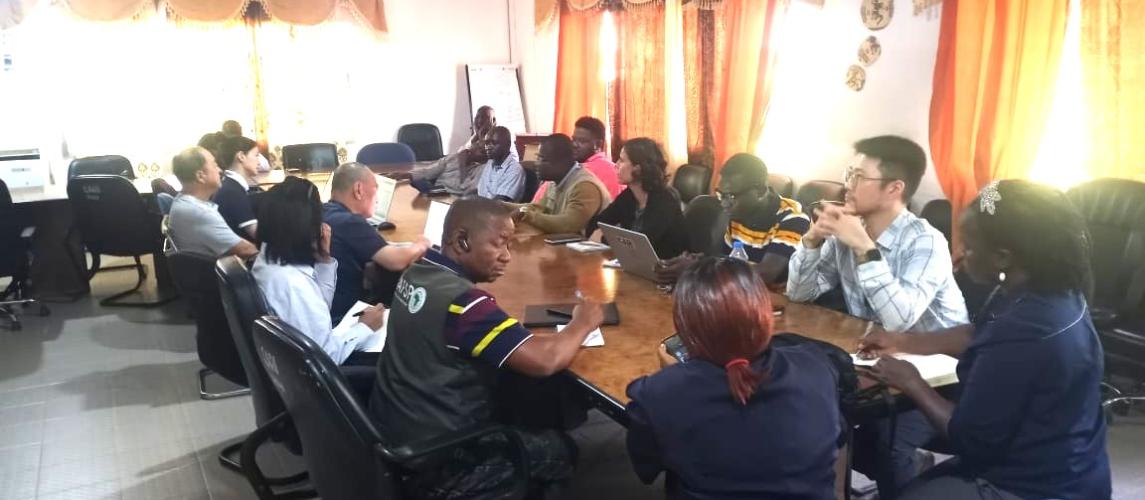
KOICA Forges Partnership with CARI to Promote Green Jobs in Liberia’s Resilient Agrifood System
SUAKOKO, Bong County – On November 12, 2025, a delegation of five experts from the Korea International Cooperation Agency (KOICA) visited the Central Agricultural Research Institute (CARI) in Suakoko, Bong County, to initiate a strategic partnership aimed at promoting green jobs for youths within a resilient agrifood system in Liberia.
The visit, followed by a guided tour to the cassava and rice research field demonstration plots, marked the beginning of an in-depth survey to assess CARI’s institutional capacity and identify opportunities to empower youth through sustainable agricultural employment. The project promises to support processing and packaging in the rice and cassava value chains.
KOICA is the official development assistance (ODA) agency of the Government of South Korea, dedicated to supporting sustainable development in partner countries. Its programs span sectors such as education, health, agriculture, governance, and infrastructure, with a strong emphasis on international cooperation and inclusive growth. In West Africa, the project is being implemented in Nigeria and Sierra Leone, with Liberia selected as part of the scale-up effort.
According to the project, agriculture remains the largest global employer, and yet it is characterized by hazardous conditions and low wages. In Liberia, where 60% of the workforce is engaged in agriculture, productivity remains low, and the country imports nearly 70% of its staple food, rice. Green jobs, defined as decent work, contribute to environmental sustainability, particularly for rural youth and women.
During the opening session, Dr. Arthur Bob Karnuah, Director General of CARI, warmly welcomed the KOICA team and expressed optimism about the collaboration. He emphasized CARI’s commitment to supporting national development goals through research, innovation, and capacity building in agriculture.
Dr. James S. Dolo, Plant Breeder, Agronomist, and Head of CARI’s Crop Program, provided a comprehensive overview of the institute’s research architecture. He outlined seven thematic research programs and 14 specialized sub-units, each designed to address critical challenges in Liberia’s agricultural sector.
A key highlight of the discussion was the progress of the KAFACI observatory trials currently underway at CARI. “These trials,” he stressed, “are part of a collaborative initiative under the KAFACI, which aims to enhance agricultural productivity and resilience through research and demonstration.”
The Head of the Crop Program emphasized the significance of the demonstration plots established under the KAFACI program, noting their role in testing climate-smart technologies, tolerant to ion toxicity, and showcasing best practices in crop management. “The trials serve as a living laboratory for training youth and farmers in sustainable agriculture, directly aligning with KOICA’s green job agenda.”
On the national context and youth empowerment, Liberia’s demographic profile presents both a challenge and an opportunity: 65% of the population is under the age of 25, and nearly 70% is under 35. However, many young people are trapped in informal, seasonal, and low-paying jobs, often leading to urban migration and underemployment.
The KOICA-CARI partnership seeks to reverse this trend by promoting climate-smart agriculture, enhancing skills development, and creating pathways for entrepreneurship in agrifood systems. The initiative will be implemented over three years (2025--2027) in collaboration with the Food and Agriculture Organization of the United Nations (FAO) and the Ministry of Agriculture (MOA).
The project aims to strengthen employability and entrepreneurship in agrifood systems, expand access to green job opportunities, foster an enabling environment for financial inclusion, digitalization, and market access, and empower youth and women as agents of change in rural development.
This partnership represents a transformative step toward building a resilient, inclusive, and sustainable agricultural sector in Liberia, one that leverages research, innovation, and international cooperation to unlock the potential of its youth.
